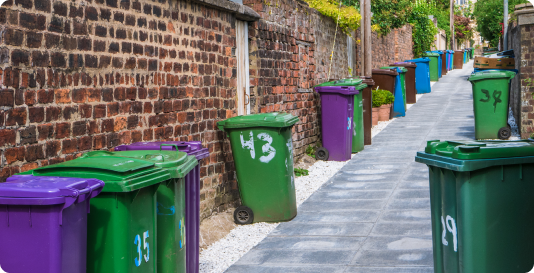A growing population in addition to cities that are facing inefficiency problems in the waste sector require green initiatives and sustainable solutions. The most current waste collection systems are outdated and lead to collecting waste too early or too late. Unnecessary collections lead to 70% higher annual collection costs and a 50% higher carbon footprint.
Data insights play a major role in smart cities and are used to manage assets, resources and services more efficiently. Smart waste management is one of the factors that can contribute to a smart city. Using IoT, smart waste solutions use sensors and dynamic routing to help local authorities optimise their waste collection system.
What are Smart Cities?
To get right to the point, smart cities use technology and innovation to tackle the problems of increasing urbanisation and increase the quality of life and well-being of residents.
It is not only about the needs and well-being of citizens but also sustainability is taken into account. Optimised processes and initiatives promote positive environmental impact. Lastly, the data-driven approach makes it possible to analyse, monitor and manage resources and services to make intelligent business decisions.
Waste Management in Smart Cities
Smart waste management is an automated and efficient way to manage waste, monitor bins with sensors and optimise capacity and collection routes. Thanks to IoT sensors in bins, data on fill levels can be automatically sent to waste collectors. In this way, current systems can be challenged and switched to a dynamic way of waste collection. It does not only optimise waste functions but also promote economic growth, it improves the quality of life for citizens and delivers on sustainability initiatives.
Needs and Solutions in Smart Cities Waste Management
Municipalities may have different needs in efficient and proper waste management for becoming a smart city. First of all, municipalities have waste containers all over the city. To track these waste containers, they can use asset management. Smart sensors track the waste containers and provide real-time information of the assets. In addition, there can be the need to ensure that the garbage trucks run as efficiently as possible. Fleet management can help to operate the trucks in the most efficient route. Another need of municipalities is the need to optimise cooperation with their citizens. This can be done through citizen management where you communicate and work together with your citizens.
What’s next?
The implementation of these solutions will further enhance the growth of smart cities. IoT technology is a crucial tool to help local authorities plan for the future and create environmental, social and economic sustainability!
Ready to introduce smart waste management to your city? Contact WasteHero today!




